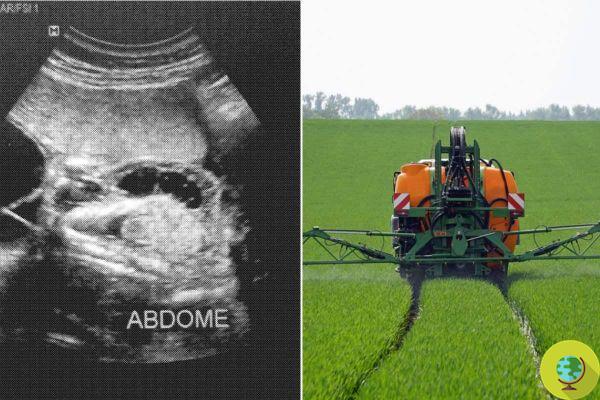
Severe malformations prevent children from coming into the world. It happens in a small town in Brazil, Uruçuí, where one in four mothers loses their baby. According to local media, the fault lies with the glyphosate used in the large soybean and corn plantations in the area
Don't store avocado like this: it's dangerous
Serious malformations prevent children from coming into the world. It happens in a small town in Brazil, Uruçuí, where one in four mothers loses their baby. According to local media, the fault lies with the glyphosate used in the large soybean and corn plantations in the area.
One story above all has moved and indignant the world. Maria Felix, 21, lost her baby at six months of pregnancy. The baby died in the womb at 25 weeks. The cause of the abortion was a serious malformation: the baby had a bowel outside the abdomen and also a series of heart problems.
As reported by The Intercept BrazilIt is not uncommon for mothers in the region to soon lose their children: the glyphosate that guarantees the wealth of the city's farmers in the south of the state is causing a veritable intoxication that has serious repercussions on mothers and children.
"It is estimated that one in four pregnant women has suffered an abortion, 14% of babies come into the world with low birth weight (almost double the national average)" explains The Intercept Brasil based on data from a survey conducted by Inácio Pereira Lima, who investigated the poisoning in Uruçuí in his graduate thesis on women's health for the Federal University of Piauí.
Maria was unable to speak, but her aunt, the civil servant Graça Barros Guimarães, told her sad story:
“The pesticide causes respiratory problems and allergies. So, if the woman is pregnant, the baby can also be infected. "
Graça said her granddaughter had always been surrounded by soybean farms. The house where she lives, in Uruçuí (in the state of Piauí), is about 15 km from a plantation. Before, she lived in the rural area of the municipality of Mirador, in Maranhão, also there in the heart of plantations.
"All this is a consequence of the economic development model in which only profit is focused, regardless of the negative consequences for the population," said researcher Inácio Pereira Lima, who blames agribusiness for the disease of the population.
Glyphosate is the most used pesticide in Brazil. Due to its effects on human health, the country had asked for a ban on its marketing until the authorities had carried out its toxicological re-evaluation. In August, glyphosate was banned but the sentence was overturned on appeal a few weeks later.
According to Dr Lima, the presence of the substance in breast milk potentially indicates two things: the contamination is direct, and the quantities used in the region's agricultural activity are so high that the excess is not degraded by plant metabolism. The women studied do not even work in the fields. According to her, the organism is contaminated by the skin and respiratory tract.
Index
Women and their children, the biggest victims
According to the records of the Regional Hospital of Uruçuí, abortions usually occur in women between the ages of 20 and 30 who reach up to the XNUMXth week of gestation. The high number of cases is mentioned by the nurse Iraídes Maria Saraiva:
“There are many women who come with bleeding or a fetus without a heartbeat. Most of these abortions are spontaneous ”.
In Floriano's maternity ward, obstetrics coordinator Luiz Rosendo Alves da Silva has seen many cases of abortions and believes that pesticides are to blame.
“It is a slow, gradual and daily contamination. The main consequence is the atrophy of some organs, mainly the heart and lungs ".
Fear and silence
In the city where almost everyone knows each other, no one wants to tell what happens. If the intoxication is more severe, workers even hide the possible cause from doctors. The people, very poor here, are afraid of losing their jobs, also because of the lack of information on the risks of pesticides.
“They don't even believe that any serious problems can occur because the damage only appears in the long term,” explains Alanne.
Glyphosate damages even for several generations
Just today comes a new confirmation of effects of glyphosate on humans. Researchers at Washington State University have discovered a variety of diseases and other health problems in the second- and third-generation offspring of mice exposed to glyphosate.
Although the research was conducted on animals, it showed for the first time that the descendants also developed diseases of the prostate, kidneys and ovaries, obesity and birth defects.
The researchers revealed that they have seen "dramatic increases" in various diseases affecting the second and third generations. The second generation had "significant increases" of diseases of the testicles, ovaries and mammary glands, but also obesity. In third-generation males, the researchers saw a 30% increase in prostate problems, three times that of a control population. The third generation of females had a 40% increase in kidney disease. Furthermore, more than one third of second generation mothers have had unsuccessful pregnancies.
"The ability of glyphosate and other environmental toxicants to affect our future generations must be taken into consideration," they said the study authors.
To say little disturbing…
READ also:
- Glyphosate: Here's why it could do even more harm than known so far
- Glyphosate: confirmed damage in pregnancy. And it would be present in 90% of pregnant women
Francesca Mancuso


























